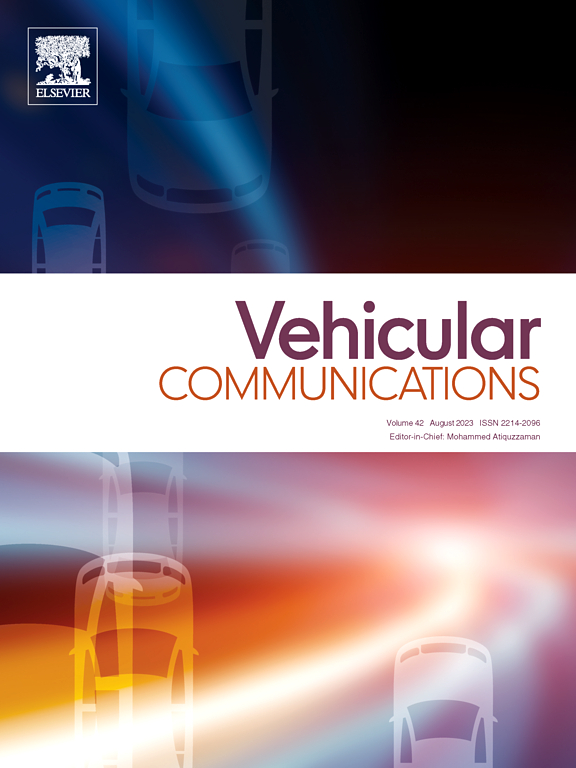Task offloading and computational scheduling in RIS-assisted low Earth orbit satellite communication networks
IF 6.5
2区 计算机科学
Q1 TELECOMMUNICATIONS
引用次数: 0
Abstract
This article investigates the joint optimization of task offloading and computation scheduling in low Earth orbit (LEO) satellite networks, where each LEO satellite is equipped with a reconfigurable intelligent surface (RIS). By considering the inherent characteristics of tasks and the energy consumption associated with task execution, we define a system utility function and formulate the problem as a constrained utility maximization problem. To address this optimization challenge, we first propose a priority-based task offloading and computation scheduling strategy tailored for single-satellite execution scenarios. Subsequently, we extend this approach to multi-satellite collaborative task execution scenarios, where a knapsack algorithm-based strategy is developed to optimize task allocation and scheduling. To underscore the advantages of the proposed RIS-assisted multi-satellite framework, we introduce a comparative analysis with a non-RIS-assisted multi-satellite offloading mode. Extensive simulations conducted in Satellite Tool Kit (STK) and MATLAB demonstrate that the RIS-assisted multi-satellite mode significantly outperforms its non-RIS counterpart in terms of system utility and energy efficiency. The results validate the effectiveness of the proposed algorithms and highlight the potential of RIS technology in enhancing the performance of LEO satellite networks.
ris辅助低地球轨道卫星通信网络任务卸载与计算调度
本文研究了低地球轨道卫星网络中任务卸载和计算调度的联合优化问题,其中每颗低地球轨道卫星都配备了可重构智能表面。考虑到任务的固有特性和任务执行过程中的能量消耗,定义了系统效用函数,并将问题表述为约束效用最大化问题。为了解决这一优化挑战,我们首先提出了一种针对单卫星执行场景的基于优先级的任务卸载和计算调度策略。随后,我们将此方法扩展到多卫星协同任务执行场景,其中开发了基于背包算法的策略来优化任务分配和调度。为了强调所提出的ris辅助多卫星框架的优势,我们介绍了与非ris辅助多卫星卸载模式的比较分析。在卫星工具包(STK)和MATLAB中进行的大量模拟表明,ris辅助的多卫星模式在系统效用和能源效率方面明显优于非ris模式。结果验证了所提出算法的有效性,并突出了RIS技术在提高LEO卫星网络性能方面的潜力。
本文章由计算机程序翻译,如有差异,请以英文原文为准。
求助全文
约1分钟内获得全文
求助全文
来源期刊

Vehicular Communications
Engineering-Electrical and Electronic Engineering
CiteScore
12.70
自引率
10.40%
发文量
88
审稿时长
62 days
期刊介绍:
Vehicular communications is a growing area of communications between vehicles and including roadside communication infrastructure. Advances in wireless communications are making possible sharing of information through real time communications between vehicles and infrastructure. This has led to applications to increase safety of vehicles and communication between passengers and the Internet. Standardization efforts on vehicular communication are also underway to make vehicular transportation safer, greener and easier.
The aim of the journal is to publish high quality peer–reviewed papers in the area of vehicular communications. The scope encompasses all types of communications involving vehicles, including vehicle–to–vehicle and vehicle–to–infrastructure. The scope includes (but not limited to) the following topics related to vehicular communications:
Vehicle to vehicle and vehicle to infrastructure communications
Channel modelling, modulating and coding
Congestion Control and scalability issues
Protocol design, testing and verification
Routing in vehicular networks
Security issues and countermeasures
Deployment and field testing
Reducing energy consumption and enhancing safety of vehicles
Wireless in–car networks
Data collection and dissemination methods
Mobility and handover issues
Safety and driver assistance applications
UAV
Underwater communications
Autonomous cooperative driving
Social networks
Internet of vehicles
Standardization of protocols.
 求助内容:
求助内容: 应助结果提醒方式:
应助结果提醒方式:


